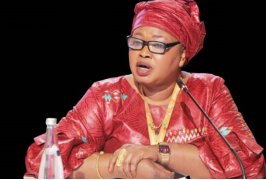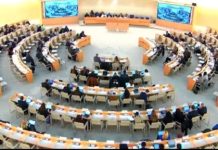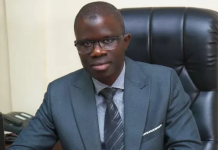By Demba Bah
The Deputy Mayor of the Banjul City Council (BCC) during the last general council meeting inquired about how the Council suffers cash trap and the Mayor gave an interesting answer.
A cash trap is a situation in which the council experiences a significant slowdown in its cash flow.
On 28 November 2023, the General Council Meeting had six agenda items; review of previous minutes, 2024 budget, financial statements of council, waste management/cleansing services, strategic development plan (formation of ward development committees).
Abdul Aziz Gaye alias Dabah, the Deputy Mayor of the city council during the meeting asked for the Council to give assurance that the ward committees would have their offices and would get their budget allocations for 2024.
Section 106 of the Local Government Act provides that “A Ward Development Committee shall be responsible for coordinating and prioritizing all development plans for approval by the Council and coordinating development assistance to the Ward.”
It went further in section 107 subsection (3) that, “In the exercise of its functions under this section, a Ward Committee may operate bank accounts and appoint a Treasurer to manage its resources and such other officers from among its members, or otherwise, as it may deem necessary.”
The Deputy Mayor raised concerns by asking how the 2023 budget 2023 was spent because the council is now facing a cash trap.
The Deputy Mayor said the issue of the cash trap was confirmed by a memo from the office of the Chief Executive Officer forwarded to all Committee heads in the council informing them that all meetings should be forwarded to 2024 due to financial constraints.
“How did we get here?” Deputy Mayor asked.
On her part, Mayor Rohey Malick Lowe promised to make the council’s audit report public. That was her reply to the question.

It could be recalled that in February 2023, The Banjul City Council appeared before the Finance and Public Accounts Committee of the National Assembly where the director of audit for local councils presented the executive summary of the management letter of the Banjul City Council’s financial report for 2019-2020. In their presentation, the auditors said they noted a suspected fraud with unconfirmed GTR numbers recorded in the market’s CRBR which were not part of the books supplied by the Gambia Printing and Publishing Corporation. The report indicated that they cannot verify the source and quantity of the books received. The auditors also said they evaluated the financial reporting framework of the council and found out that BCC did not have an accounting policy with respect to revenue and expenditure.
The audit report stated that: “The 2019 comparative figures were not confirmed due to absence of evidence and the council’s cash books were not properly maintained for the year 2019-2020 while no bank reconciliation statement was performed for 2019 and 2022,” the auditor told the committee in front of BCC mayor and officials. The auditors further said there was no monthly cash book and general ledger. According to the auditors, they noted weaknesses about revenue such as the unavailability for audit of some GDR issued to the main cashier as well as individual cash books for collectors at Albert Market. The auditors reported that they reviewed the procurement of the council for 2019-2020 and noted weaknesses such as overpayment of D675,000 to UXL (difference between contract sum and actual payment).”
The auditors said the council also paid nearly Two Million Dalasi (D2,000,000) for the construction of an abattoir and stores, which they found not to be properly constructed. They said the council also purchased trash bins at Thirteen Million and Thirty-Nine Thousand Eight Hundred and Fifty Dalasi (D13,039,850) without following the right tender procedure.
The National Assembly Committee on Finance and Public Accounts rejected the Banjul City Council’s 2019-2020 financial statements. The financial statements were from 1 January 2019 to 31 December 2019 and 1 January 2020 to 31 December 2020.
“They are rejected because of the disclaimer of the external auditors that because of the significance of the matters described in the basis for disclaimer of opinion paragraph, we have not been able to obtain sufficient appropriate audit evidence to provide a basis for an opinion. Accordingly, we do not express an opinion on the financial statements,” the external auditor said.
He said the financial statements do not adhere to the adopted accounting basis and there were material misstatements in the financial statements.
“The absence of reliable explanatory notes to the Financial Statements of 2020; the FPAC decides that the Banjul City Council should re-do their financial statements for 2019 and 2020 and submit them in April 2023. The Council is hereby reminded that financial statements should reflect the true and fair nature of the financial position of the institution and any repeated misrepresentation will result in contempt of the Committee (FPAC) and by extension the National Assembly,” Honorable Fofana concluded.
Pa Mahmoud Ceesay, Councillor for New Town West Ward said the estimates for 2024 should reflect the needs and aspirations of their wards. Modou Bah, Councillor for Half-Die Ward asked the CEO why the 2023 budget estimates for the establishment of an office for Ward Development Committees were not implemented after being approved. In his answer, the CEO re-directed the question to the Finance Director who said budget implementation depends on priority areas.






















